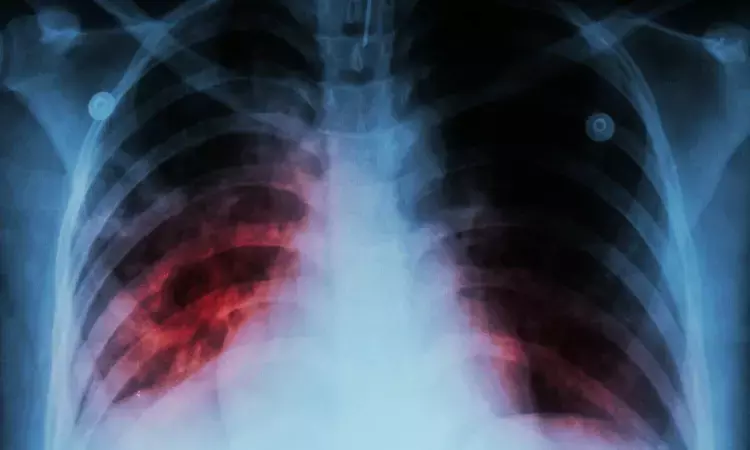- Home
- Medical news & Guidelines
- Anesthesiology
- Cardiology and CTVS
- Critical Care
- Dentistry
- Dermatology
- Diabetes and Endocrinology
- ENT
- Gastroenterology
- Medicine
- Nephrology
- Neurology
- Obstretics-Gynaecology
- Oncology
- Ophthalmology
- Orthopaedics
- Pediatrics-Neonatology
- Psychiatry
- Pulmonology
- Radiology
- Surgery
- Urology
- Laboratory Medicine
- Diet
- Nursing
- Paramedical
- Physiotherapy
- Health news
- Fact Check
- Bone Health Fact Check
- Brain Health Fact Check
- Cancer Related Fact Check
- Child Care Fact Check
- Dental and oral health fact check
- Diabetes and metabolic health fact check
- Diet and Nutrition Fact Check
- Eye and ENT Care Fact Check
- Fitness fact check
- Gut health fact check
- Heart health fact check
- Kidney health fact check
- Medical education fact check
- Men's health fact check
- Respiratory fact check
- Skin and hair care fact check
- Vaccine and Immunization fact check
- Women's health fact check
- AYUSH
- State News
- Andaman and Nicobar Islands
- Andhra Pradesh
- Arunachal Pradesh
- Assam
- Bihar
- Chandigarh
- Chattisgarh
- Dadra and Nagar Haveli
- Daman and Diu
- Delhi
- Goa
- Gujarat
- Haryana
- Himachal Pradesh
- Jammu & Kashmir
- Jharkhand
- Karnataka
- Kerala
- Ladakh
- Lakshadweep
- Madhya Pradesh
- Maharashtra
- Manipur
- Meghalaya
- Mizoram
- Nagaland
- Odisha
- Puducherry
- Punjab
- Rajasthan
- Sikkim
- Tamil Nadu
- Telangana
- Tripura
- Uttar Pradesh
- Uttrakhand
- West Bengal
- Medical Education
- Industry
New possibilities for the treatment of pulmonary fibrosis revealed in nano drug delivery breakthrough

Pulmonary fibrosis is a progressive incurable disease that results in the stiffening of the lungs through scarring,
Scientists at Masonic Medical Research Institute have discovered a novel way of treating pulmonary fibrosis using nanoparticles-materials thousands of times smaller than the diameter of a human hair.
The findings of study have been published in the American Journal of Physiology-Lung Cellular and Molecular Physiology.
“While these findings do not yet necessarily cure this disease outright, it shows we have the potential to dramatically impact and improve the quality of life for those affected,” said the study’s senior investigator, Jason R. McCarthy, Ph.D., Associate Professor and Science Operations Director at MMRI.
Dr. McCarthy along with 15 collaborators on this project, which include scientists from the MMRI, Massachusetts General Hospital, and Harvard Medical School, embarked upon this study in 2015.
The team focused on the development of nanoparticles capable of targeting fibroblasts in the lung-the cell type responsible for the scarring-in order to deliver an effective drug that halts the progression of the disease.
“The idea behind the study was not to find a novel therapeutic, per se, but to look at whether delivering effective known drugs to specific cells in the lung can have a more potent therapeutic effect,” Dr. McCarthy shared. “What we showed is that it is indeed possible to target a drug to diseased cells to interrupt the process of cell death and scarring.”
Dr. McCarthy and his team are currently investigating whether this strategy could benefit other cell types in the lung as well, elucidating how they function, or malfunction, in the course of idiopathic pulmonary fibrosis. Similarly, they are also expanding their research beyond the lung, to investigate how use of this strategy can work in other organ systems, including the heart and liver.
Reference:
Rachel S. Knipe, Md Nurunnabi, Clemens K. Probst, Jillian J. Spinney, Elizabeth Abe, Rajendran J. C. Bose, Khanh Ha, Amanda Logue, Trong Nguyen, Rachel Servis, Matthew Drummond, Alexis Haring, Patricia L. Brazee, Benjamin D. Medoff, and Jason R. McCarthy n10 JAN 2023 https://doi.org/10.1152/ajplung.00086.2022
Dr Kamal Kant Kohli-MBBS, DTCD- a chest specialist with more than 30 years of practice and a flair for writing clinical articles, Dr Kamal Kant Kohli joined Medical Dialogues as a Chief Editor of Medical News. Besides writing articles, as an editor, he proofreads and verifies all the medical content published on Medical Dialogues including those coming from journals, studies,medical conferences,guidelines etc. Email: drkohli@medicaldialogues.in. Contact no. 011-43720751


